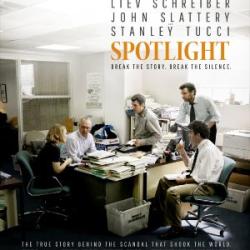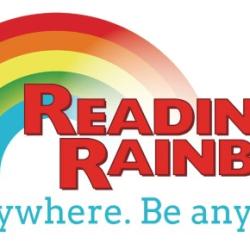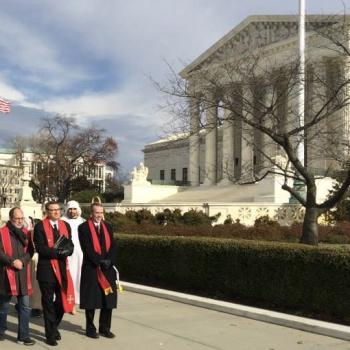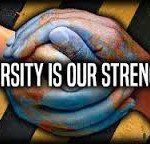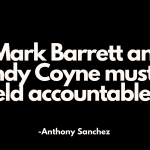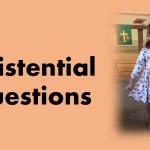My evangelical Bible college trained me to consult a Nazi propagandist. Worse, that propagandist used the New Testament to promote racist, anti-Semitic, White supremacy. I just hope my teachers didn’t know what they were doing.
Nazism Was Part Of My Childhood
By the time I was in college, Nazism wasn’t strange to me–it had been part of my childhood. Don’t jump to any conclusions, though. My home was anything but anti-Semitic. My Jewish namesake, an uncle I never knew, Captain Robert L. Schenck (USAF), flew a record number of B17 bomber missions over the European theater during World War II and helped win the war against Hitler.
My late father, Hank Schenck, was, as you might imagine, also Jewish. (Of course!) My mother, Marjorie (nee’ Apgar-Wright), was born and baptized Catholic but converted to Judaism to marry my father. Still, she brought two young daughters into the new marriage, with their Christian traditions, like Christmas and Easter, which had informed their prior home life. So, my identical twin brother and I, born to the new union, knew a hybrid religious experience. Nevertheless, my father was sure all four kids learned about the Holocaust.
Some of my earliest memories of my dad include sitting on his knee as he pored over a homemade scrapbook of the Nazi horrors. In age-appropriate ways, he told my siblings and me what had happened in Germany just twenty years earlier. As young as 6 or 7, I learned a phrase from Dad’s tutelage, “Man’s inhumanity to man.”
As I grew older, Dad told me the Nazis weren’t just “over there in Europe” but “right here in the United States.” I didn’t believe him, mainly when he talked about a “big Nazi rally” in New York City, terrifying his parents, who maintained a small business there. It wouldn’t be until just a few years ago, after I watched filmmaker Marshall Curry’s mini-documentary, “A Night at the Garden,” that I realized Dad’s report was accurate. He would have been ten years old in 1939 when giant swastikas adorned Madison Square Garden as 20,000 Hitler admirers raised their arms in the classic and revolting salute.
Notwithstanding my early orientation to the hate-filled, racialized, violent, and genocidal Third Reich, with its American sympathizers, I missed its presence in the new and dynamic religious community I would embrace as a teenager.
Mom and Dad raised their kids to choose their own religious paths. My brother and I decided on evangelical Christianity. After making our public professions of faith at age 16, we both felt an early “call to preach.”
The Nazi On The Shelf
Following high school graduation, my brother and I attended a small ministerial “Bible college,” where an instructor introduced my class to the Theological Dictionary of the New Testament, edited by a mysterious scholar named Gerhard Kittel. The 1300-page tome was an abridged version of an original nine-volume set, two of which were on the school’s library shelves.
All anyone told me about Kittel was that he was German and one of the most outstanding Biblical scholars of the last century. He was so good that a minister dared not attempt composing a sermon on any New Testament passage without first consulting Kittel’s dictionary, which was more of a broad biblical commentary.
“Did you consult Kittel on that?” my homiletics (or “preaching”) instructor asked me.
“Oh, I went to Little Kittel for this one,” a classmate gushed after he got a 100 on a paper. (His “Little Kittel” referred to that abridged version of the larger muti-volume version, affectionately called “Big Kittel.”)
“Never take it to the pulpit without comparing notes with Kittel’s dictionary,” another lecturer admonished.
I took them all seriously and purchased my own copy of “Little Kittel.” I have kept one on my study shelves for nearly 50 years.
Kittel has served me well. His exposition of Greek terms based on their biblical, historically secular, and even rabbinical contexts has proven enormously helpful in my preaching, teaching, and writing.
Still, during those Bible college days, something lurked in Kittell’s shadow that never came up in the many discussions about him or the research papers referencing him. Later, as I set out in my ministerial career and encountered Kittel on the shelves of my colleagues’ home and church libraries, no one said anything more about the scholar than was already known. Kittel was “the best,” “brilliant,” and “indispensable when it comes to word meanings in the New Testament.”
My Shocking And Disheartening Discovery
It wasn’t until I enrolled in a late-in-life doctoral program that I discovered the well-kept and dark secret about the editor of the evangelical preachers’ gold standard reference text.
At the outset of my program, I intended to research and write my dissertation on one of my great heroes of the faith, the World War II-era German resistance leader, moral theologian, and martyr Dietrich Bonhoeffer. I scuttled that plan after one of my principal advisors asked if I was prepared to master mid-twentieth-century German to read Bonhoeffer’s original writings. When I comedically answered, “Nein!” he recommended I explore the “German church struggle,” which formed the context for Bonhoeffer’s bravery and ethical insights.
When I took on the crisis in that period’s “Deutsche Evangelische Kirche,” or “German Evangelical Church,” the most significant religious body in that country at that time, it connected me with the work of Holocaust scholar Robert Eriksen. His book, Theologians Under Hitler, had been made into a film by a new colleague friend, Rev. Steve Martin.
Eriksen’s work closely examined the stories of three prominent and influential theologians who enthusiastically greeted the rise of Adolf Hitler as a “gift and miracle from God.” Each became an avid Nazi, with one contributing to a bogus theological institute working to strip the Hebrew Scriptures from the Bible and argue that Jesus was an Aryan. The latter’s name? Gerhard Kittel.
These shocking facts about Kittel revealed in both the book and movie, stunned me. They put my formative institutions, teachers, and colleagues to shame. They embarrassed and unnerved me. Why wouldn’t my professors–Why wouldn’t I–have more carefully investigated a German religious figure of that era?
Well, there was something of an answer to that haunting question–but not an adequate one.
My Wrong Assumptions About Christian Scholars And Nazis
I never thought a Bible scholar on Kittel’s level could have bought into the cruel, arrogant, racist, and murderous Nazi ideology. I assumed from the get-go that sincere Christian believers–students of the Bible, followers of Jesus–were four-square against Hitler, condemning Nazism, and always only for the Jews. After all, Jesus, Mary, and Joseph were Jewish, as were all the early disciples and Apostles. All but one New Testament author was Jewish. In John 4:22, Jesus unambiguously declares, “Salvation is of the Jews.”
In processing my profound disappointment, even disgust in Kittel and his fellow Nazi theologians, I experienced a more profound disillusionment about my own spiritual community. Why had no one at my Bible college discovered this bitter fact about such a revered figure as Kittel?
My inability to answer that question led to a more bitter realization. Perhaps plenty of people in my world knew about the corrosive elements in Kittel’s soul. Surely more than just one professor in an obscure religious school knew about this Nazi apologist? After all, following the war, the Allied forces arrested and jailed Kittel for collaboration with the Nazis. Even in prison, he defended his anti-Semitic beliefs and died miserably while still an ideological adherent.
No one but Bob Eriksen knew this secret? Impossible.
My further studies revealed that many others indeed knew about Kittel and his contemporaries, Paul Althaus, Emanuel Hirsch, and more. The information was plentiful and accessible. (A simple Google search on “Christians, the churches, and the Third Reich” will reveal just how plentious it is!) By the ime I was reading Kittel, scholars and church historians had been publishing and convening conferences on this ugly piece of Christian culture for decades. Yet, with all the literature, films, audio recordings, and even surviving eyewitnesses testifying to Christian guilt for one of the most brutal and inhuman regimes in world history, no one bothered to tell me or so many other Christian leaders-in-formation that our much-relied-on scholar was the embodiment of that evil.
Hm. Why might that be?
How A Nazi Went Undetected
The only answer to this mystery that I can come up with is that there is an appalling and pervasive ignorance in the American evangelical academy–or something far worse. If it’s the former, those who care about it need to do more to foster a deeper curiosity, a healthy skepticism, and a robust interrogation of our sources. If it’s the latter, we need even more to call it out for what it is: evil, ignorant, racist.
If I didn’t learn what I should have about Gerhard Kittel because no one knew, that’s bad enough. If those who didn’t know didn’t want to know, that’s worse. And if someone knew but didn’t say, that’s the very worst.
Purging The Nazis From Among Us
I’m still coming to terms with all this. I say it to myself as I seek to remedy it: My evangelical Bible college trained me to consult a Nazi propagandist who used ersatz scriptural scholarship to promote racist, anti-Semitic, White supremacy. Whether it was deliberate or inadvertent, it’s breathtaking.
Until we evangelicals face our failures and name them aloud before God, others, and ourselves, we cannot be free from their consequences or the dangers they pose. Our historic disdain for critical thinking, our Bible teacher celebrity culture, and our generally naive gullibility do not serve us or the witness of the gospel well.
Now, don’t think I’m recommending cancel culture. I don’t think the solution is burning books–certainly not Kittel’s unparalleled Dictionary. He may have misused Scripture in other settings, but not in his best-known work. I do think it’s possible to still benefit from his incomparable scholarship while holding it in tension with his profound and enormously consequential moral failings. In fact, Kittel’s duplicity may be a key to understanding the current socio-political phenomena we’re observing in American evangelicalism. We ignore the real and self-conflicted Kittel at our own continued peril.
However we might end up adjudging Kittel, and whatever we decide to do with him or his Dictionary, it’s time for a reckoning with history, truth, and sin in our evangelical institutions of higher learning. Who and what else lurks on our library shelves, in our historical formation, and even our psyches?
If Kittel roamed among us undetected for so long, surely there are others.







